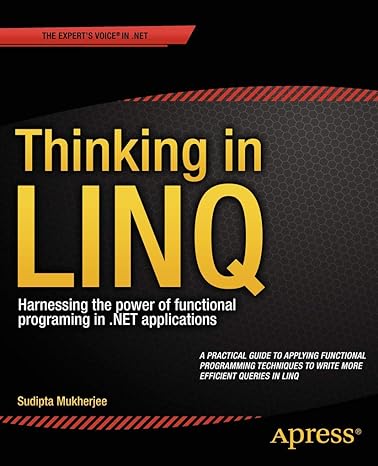Go back


Thinking In LINQ Harnessing The Power Of Functional Programming In .NET Applications(1st Edition)
Authors:
Sudipta Mukherjee

Cover Type:Hardcover
Condition:Used
In Stock
Include with your book
Free shipping: April 23, 2024Popular items with books
Access to 3 Million+ solutions
Free ✝
Ask 10 Questions from expert
200,000+ Expert answers
✝ 7 days-trial
Total Price:
$0
List Price: $42.94
Savings: $42.94(100%)
Book details
ISBN: 143026845X, 978-1430268451
Book publisher: Apress
Get your hands on the best-selling book Thinking In LINQ Harnessing The Power Of Functional Programming In .NET Applications 1st Edition for free. Feed your curiosity and let your imagination soar with the best stories coming out to you without hefty price tags. Browse SolutionInn to discover a treasure trove of fiction and non-fiction books where every page leads the reader to an undiscovered world. Start your literary adventure right away and also enjoy free shipping of these complimentary books to your door.
Thinking In LINQ Harnessing The Power Of Functional Programming In .NET Applications 1st Edition Summary: LINQ represents a paradigm shift for developers used to an imperative/object oriented programming style, because LINQ draws on functional programming principles. Thinking in LINQ addresses the differences between these two by providing a set of succinct recipes arranged in several groups, including: Basic and extended LINQ operatorsText processing Loop refactoring Monitoring code health Reactive Extensions (Rx.NET)Building domain-specific languagesUsing the familiar "recipes" approach, Thinking in LINQ shows you how to approach building LINQ-based solutions, how such solutions are different from what you already know, and why they’re better. The recipes cover a wide range of real-world problems, from using LINQ to replace existing loops, to writing your own Swype-like keyboard entry routines, to finding duplicate files on your hard drive. The goal of these recipes is to get you "thinking in LINQ," so you can use the techniques in your own code to write more efficient and concise data-intensive applications.
Frequently Bought Together
Top Reviews for Books
Ronald D Johnson Jr
( 5 )
"Delivery was considerably fast, and the book I received was in a good condition."









